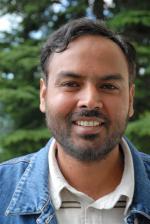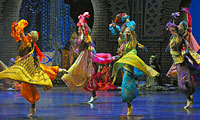
Despite profiling, the Search For Common Ground continues
 Yet another inexplicable case of profiling has come to light. On January 26th, 36 year old Rashad Bukhari arrived from Pakistan with a valid multi-entry visa into the US. Bhukhari is a former employee of the U.S. Institute for Peace, and currently the Urdu-language editor of the Common Ground News Service, whose goal is to build bridges between the Muslim world and the West. The news service is funded by the Search for Common Ground, a conflict resolution and conflict prevention ngo.
Yet another inexplicable case of profiling has come to light. On January 26th, 36 year old Rashad Bukhari arrived from Pakistan with a valid multi-entry visa into the US. Bhukhari is a former employee of the U.S. Institute for Peace, and currently the Urdu-language editor of the Common Ground News Service, whose goal is to build bridges between the Muslim world and the West. The news service is funded by the Search for Common Ground, a conflict resolution and conflict prevention ngo.
Immigration officials at Dulles could have easily verified all of this if Rashad had been allowed to make a phone call or if they themselves had chosen to check. Rather, they detained him for 15 hours, temporarily took away his cellphone and laptop, and eventually put him on a plane back to Pakistan. They prepared a transcript of the encounter in which an official justifies the United States not honoring Rashad’s visa by saying, “You appear to be an intending [sic] immigrant.” [Washington Post]
Bukhari was refused entry because the immigration agent he spoke with found that he was an “intending immigrant” or that he had an intent to remain in the US. His visa was a temporary visa (probably visitor). However, Bukhari has a wife and three children in Pakistan, a return ticket there, and a good job, all of which would normally indicate that he has no intention of remaining here in the US. The number of connections you have in your home country is what determines whether you have ‘an intent to remain’ in the US, and Bukhari’s connections, in ordinary circumstances, would be more than enough to assure authorities that he would return to Pakistan.
In words that don’t appear on the transcript of the case, the official told Bukhari that he could “voluntarily” withdraw, return to Pakistan, and reapply for another visa, or face a five year ban. So he left, and now faces the consequences that accompany being refused entry at a border.
Please understand how many layers of impact such incidents create. At a personal level, it puts a stain on my record and a question mark over my future international travel; at a more general level, it reinforces the negative reality that we at Search for Common Ground are trying to shift. I understand that security agencies need to protect their country from harm. And I support them. But unnecessary screening and overreacting because of distant fears and suspicions do not get us anywhere.” [Washington Post]
Meanwhile, there are some efforts underway in Washington to increase understanding between the West and Muslim and Arab worlds. Since last Monday, 800 artists from the vast and varied Arab world have descended on the banks of the Potomac, in the  Kennedy Center, to share their incredible works.
Kennedy Center, to share their incredible works.
Egyptian writers will mingle with Lebanese musicians. Moroccan dancers will perform alongside Iraqi singers. Palestinian filmmakers will dwell among Tunisian actors, Kuwaiti calligraphers and Jordanian painters… Old will meet young, as tradition overlaps with modernity and shared compulsions toward beauty, creation and expression trump political sparring and religious divisions. The Kennedy Center’s Arabesque festival will be the largest congregation of Arab artists the world has ever seen. [WaPo]
This festival has been 5 years in the making. Planning for it has been a huge operation spanning 22 countries, 10 time zones, 800 visas, and 2 tons of cargo that were tracked traveling from the Middle East.
Production of the festival has been a herculean undertaking. Five years in the making and encompassing 22 countries, it entailed a level of logistical coordination far beyond anything the Kennedy Center has attempted. Forty performing groups, 800 visas, middle-of-the-night conversations across 10 time zones, two tons of cargo being tracked as it travels from the Middle East. Enough drama, decor and design to transform the white-walled Kennedy Center into a beautiful, bustling Arab universe.
It will be a momentous occasion for the artists. Even more so for us. Unshackling ourselves from blurry stereotypes and half-formed conceits, we will step into their world without leaving the borders of our city. We’ll give ourselves over to the rare and precious opportunity to see, hear and taste the flavors of Arab culture through the intimate dialogue exchanged between artist and audience. [WaPo]
The arts have a way of bridging differences and bringing understanding that is definitely needed today between Washington and the Muslim and Arab worlds, as Mr. Bukhari’s case illustrates. Though it may be too late to prevent Mr. Bukhari’s fifteen hour detention and unreasonable refusal of entry, let’s hope that efforts such as the Kennedy Center’s undertaking signal a trajectory towards greater understanding between the American community and Arab and Muslim communities.
If you’re in the Washington area, do check out some of the amazing shows which run through March 15th. Many are free, and all are affordable. Some upcoming shows include:
Bnet Houriyat (Wed. March 4th at 6 pm- free)- I love the resemblance with giddha, especially the kikli!:

Djamel Laroussi (Sun. March 15th at 6 pm- free):















This is the tragedy "Muslims " will always suffer from due to a a philosophy called
"AL-TAQIYA…"
No one will ever know under this philosophy if he is a friend or a foe.
This is the tragedy “Muslims ” will always suffer from due to a a philosophy called
“AL-TAQIYA…”
No one will ever know under this philosophy if he is a friend or a foe.